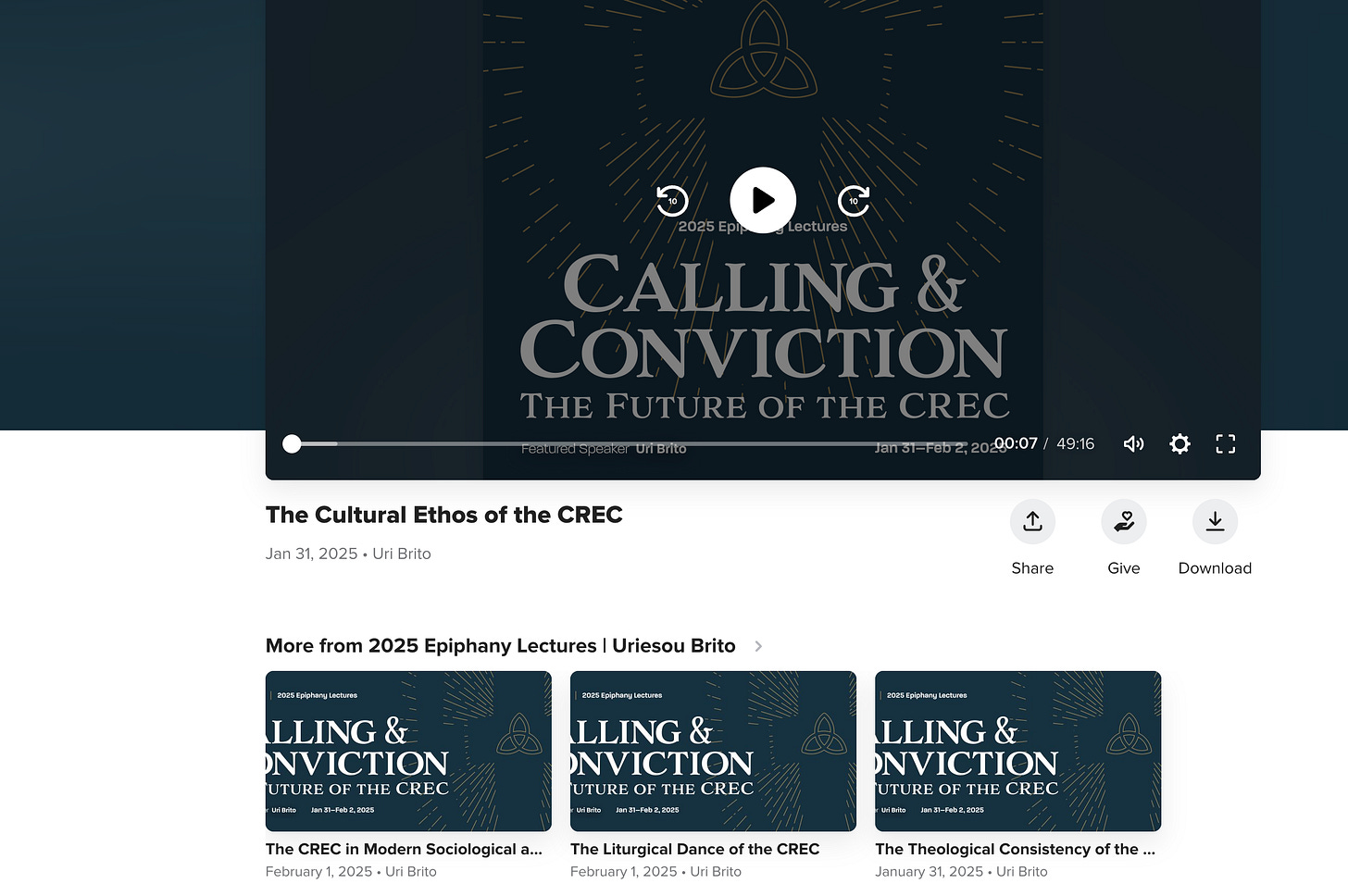The Art of Gentleness and the Tender Invitation to Dialogue
How is the fruit of gentleness exercised in our day?
Note: You can find the first of this long series here.
We now enter into the final triad, the last three fruits of the Spirit. We contemplated the concept of faithfulness, which embodies an act of fidelity and steadfastness. Faithfulness is a “persistent loyalty to truth.” It’s the opposite of cunning and deceitful. Remember the fruit of the Spirit is the way of life under the new Adam, Jesus Christ. The first Adam was not faithful, but the new Adam is.
Paul’s list in Galatians contrasts with what he saw among the Galatian Christians. The Galatian Christians are acting like the first Adam; they are following a false script, not being interested in faithfulness but in following the desires of the flesh. Paul offers them a new way of living.
In our penultimate essay, I’d like to address the topic of gentleness as one of the three final virtues that pertain to relational blessings in the community.
He caressed his father’s face on the Eve of Christmas. It was a tender gesture applied to a man who had loved his son. His father was now on his deathbed, and his children were surrounding him. He was a well-known figure in his town, and naturally, the reporters were all waiting to hear about the death of this beloved man. He died peacefully near midnight.
The oldest son stepped out to talk to the reporters, and one of the reporters jumped at the opportunity and asked: “What do you think is your father’s greatest accomplishment?” The reporter was likely expecting his son to discuss the legislation his father sponsored or the bestseller he had written. Still, the son looked straight into the camera and said: “My father’s greatest accomplishment was his gentleness.” “Gentleness,” the reporter asked, amused. “That’s right. His gentleness defined his life.”
The Reformed Legacy of Gentleness
While many in the Reformed world have chosen an ugly, putrid, and unkind way of speaking of other believers, the Puritans, those who were falsely known as legalistic and ungracious, spoke profusely about gentleness in the 17th century:
Richard Sibbes: “The gentle soul is the soul that is most like Christ” (The Bruised Reed, 1639).
Thomas Watson: “Gentleness is a sweet and pleasant virtue, and it is a great ornament to the Christian” (A Body of Divinity, 1668).
John Owen: “We must be gentle and compassionate towards sinners, lest we provoke them to wrath” (Communion with God, 1681).
Richard Baxter: “Gentleness is a fruit of the Spirit, and it is a great blessing to the church” (The Practical Works of Richard Baxter, 1696).
Gentleness should be deeply embedded in the Reformed Christian! The way he moves and lives should be defined by gentleness.
The remarkable path to the eighth fruit of the Spirit is prone to misunderstanding. “There is a pseudo-gentleness that is timidity, and there is a pseudo-meekness that is cowardly.”[1] And I am using both “gentleness” and “meekness” as identical for our purposes. Throughout the book of Isaiah, God portrays himself as the God who is all-powerful but full of gentleness.
Isaiah 40 says, “He tends his flock like a shepherd; He gathers the lambs in his arms and carries them close to his heart; he gently leads those that have young.”
This is who God is; this is who the Father, the Son, and the Holy Spirit are. God guides us into dialogue, but you can only persuade the other if there is a history of gentleness. And our God has been gentle with his people from their birth to their everlasting life.
Some, of course, may wonder: “But when I am defending the Christian faith, then I am in attack mode, right? That’s when I bring out my combative spirit.” Even in such situations, the Bible adds gentleness. Peter’s words in I Peter 3:15: “Always being ready to make a defense to everyone who asks you to give a reason for the hope that is in you, yet with gentleness and reverence…”(emphasis mine).
Even when we are called to provide a case for the Gospel, we do it with gentleness. I have a dear Brazilian friend who does street evangelism in London, and he has been accosted on numerous occasions. Gentleness does not mean you take a beating or allow others to mistreat you. We may be tempted to think gentleness is born out of weakness, but in the Bible, gentleness is born out of strength. Moses, one of the most astounding and powerful human figures in the Bible, was declared to be the meekest man on earth; the most gentle man on earth. God drew Moses close in dialogue, and Moses spoke with God.
Gentleness Defined
So, what is gentleness?
In light of this vast array of biblical passages on gentleness, we can define it as an invitation to a tender dialogue.
In Galatians, Paul applies all nine virtues to the church. It’s obvious that the Galatians were torn asunder by false doctrine. The fruit of the Spirit has a sneaky way of confronting our fondness for isolation or running away from problems. Gentleness does not run away from problems; it invites tender dialogue.
Jesus says, “Come unto me all you who are heavy laden, and I will give you rest.” It strikes me that Jesus’ words are precisely the kind of invitation that the church should extend to the world— an invitation to rest. The world is weary because it continually rejects the gentleness of Jesus, and therefore, the world is constantly unrested.
There is a remarkable text in Psalm 18 where David says, “Your gentleness makes me great;” another translation of the word renders it, “You stoop down to make me great.” This is it! Gentleness stoops down to make someone else heard, valued, and at rest. Gentleness demonstrates “respect for the personal dignity of another person.”[2] It is not coercive. It does not use “intimidation or domination,”[3] it stoops to the little child who doesn’t see it and explains it; it invites the hard-hearted to coffee to talk further. The gentle Christian de-escalates tension rather than raising it. He realizes that every time someone opposes you, it opens the door to express gentleness and understanding.
We should not let the left co-opt the fruit of the Spirit. These are spiritual virtues that belong to the Church, so let us embrace and practice them, and the more we practice, the more familiar and at ease we will be with eating from this tree of life.
A Culture of Trust Through Gentleness
Paul says in Colossians, “Clothe yourselves with gentleness.” The season of Pentecost is a season for ritual inventory. This is a season to consider whether our reactions have led to tender dialogue or constant consternation, whether our words are stirring greater faith and unity in the body, or more distrust. We live in an age where young men in their 20s and 30s distrust everyone and every institution. They have been lied to by many, and now, because of their enlightenment, they don’t trust anyone anymore. There is a lot to say, but the solution is not the abandonment of gentleness. When there is no trust left, there is always gentleness available. Gentleness is one way to rebuild a culture of trust.
Gentleness is to be used at all times and all places: at home, work, church, a dinner party, a debate, a sale, a reconciliation, a parting of ways. Gentleness needs to be the recipe remembered for the great feast, the genesis of the words spoken, the heart of the table set, the peace that is passed, and the foundation of the life lived before God and man.
Growing in Gentleness
The reason so many of us get so easily frustrated by opposing voices is that we have not developed a taste for gentleness. We have treated this fruit like a meaningless currency. We treat the call to a tender dialogue as an option, rather than a way of being. We prefer to eat of trees that exalt anger, bitterness; we prefer monologues to dialogues. And then we wonder how our marriages got here, how my relationship with my grown children got here, why my communication with loved ones is so superficial. In most of these cases, it’s because I adore the sound of my voice, my opinion, my desires, and my way.
We talk and talk, and when someone else talks, we are eager to speak again, and sometimes fail to listen to what they are saying. But gentleness opens our ears to other faithful voices, but our own. Yes, there is one voice you should never be open to hearing: the voice of evil. When that voice speaks to you, talk like Jesus, “Thus saith the Word of the Lord…”
The most faithful Christians I’ve met are those who do not degrade, belittle, or gossip about other people’s sins, but rather are humble enough to grieve for that person and to pray for their repentance.
Communicating with Gentleness
What we are seeking as a people is a gentle spirit that takes our advents and carries us to Christmas morn year after year. What we are seeking is a considerate spirit that seeks the well-being of others, that stoops low to make others great, that invites others to tender dialogue rather than harsh and rash conversation.
Whatever theological position you hold to or even how accurate you think it is, if it is not communicated with love and gentleness, it will carry no lasting legacy. Now, you can make your case mighty tight with carefully organized arguments, meticulous syllogisms, but if it’s not done with gentleness, there is a high likelihood you will chase people away.
When the greatest Apostle addressed the Thessalonians, he didn’t say, “Be tough and speak your mind!” Instead, Paul says in I Thessalonians 2: “We were gentle among you, like a mother caring for her little children.” Gentleness has a caring quality to it. That means that you need to exercise more gentleness with those around you. But don’t think you will magically wake up with the gentleness gene tomorrow, you must desire this fruit.
We have to decide whether we want the well-being of others in our speech or whether we are content to lord over others. We must determine whether we truly want a tender dialogue or a shouting match. Our temptation is to explode when circumstances take a different fork on the road, but gentleness is needed precisely because circumstances so often turn out other than what we expected. So, we need to commit ourselves to gentleness as a virtue worth having.
Gentleness is the key to unity. If our legacy is to be marked by love, joy, peace, patience, goodness, faithfulness, then gentleness opens those outside the church to see the church as the only true place where such fruits can be evident. I pray that in the end, our legacy will be rooted in our gentleness.
God is a gentle God who is ready to feed us and enter into a tender dialogue with his children. Let us come together and reason, says the Lord, for the fruit of the Spirit is gentleness.
[1] Jerry Bridges.
[2] Bridges.
[3] Bridges
Notations
My lectures on the CREC are now available at Trinity Reformed Church website:






